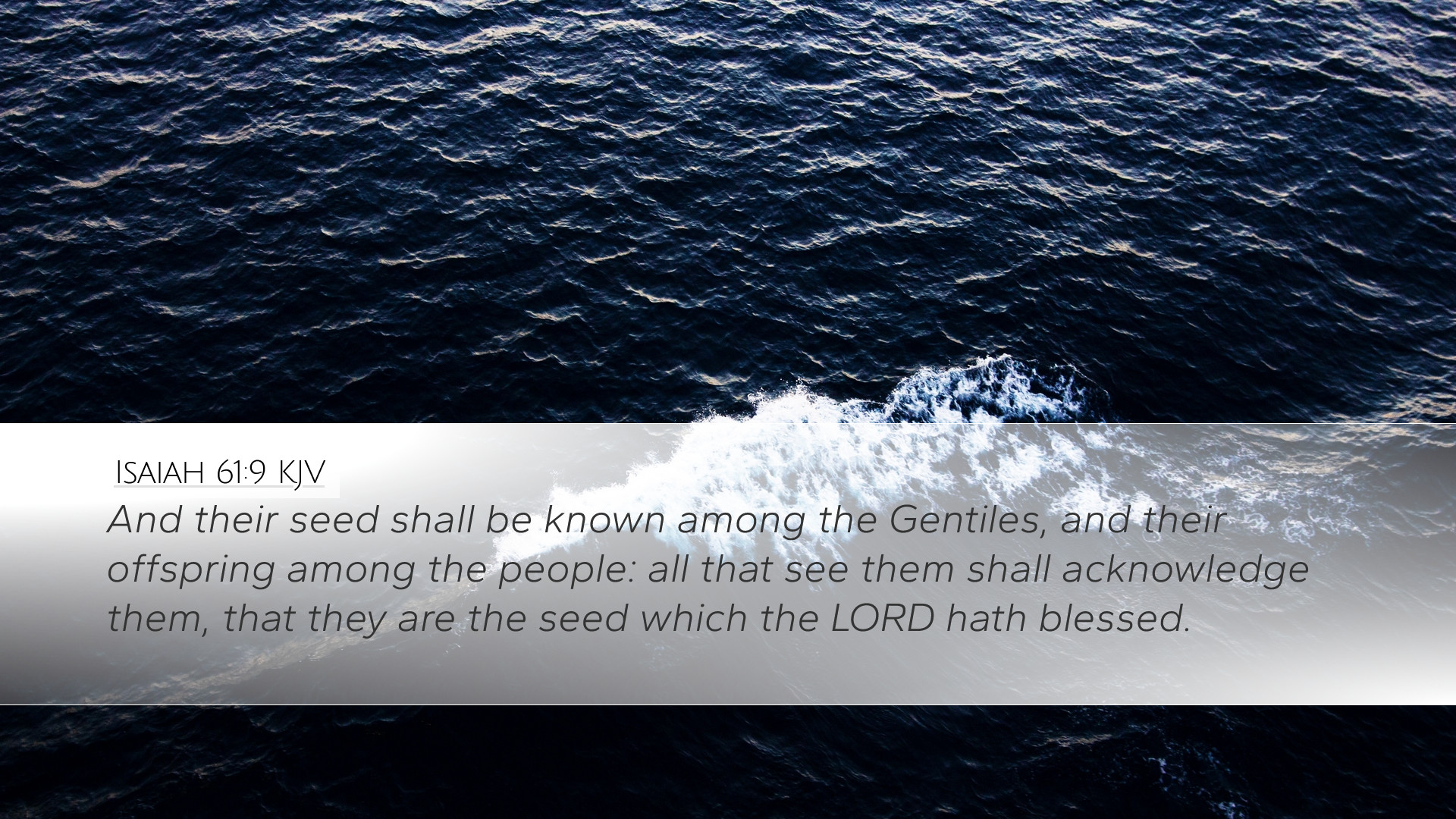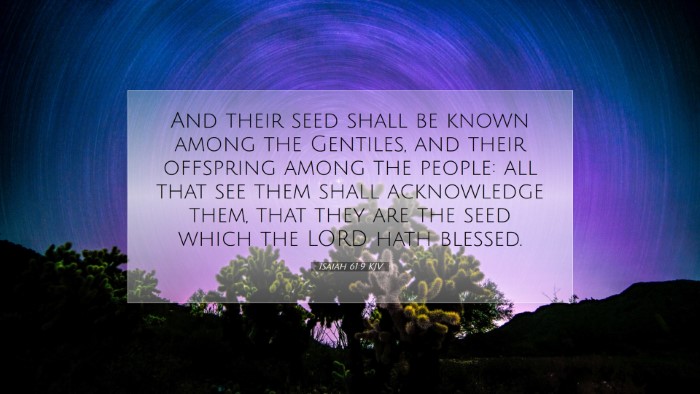Commentary on Isaiah 61:9
Isaiah 61:9 states, "And their descendants shall be known among the nations, and their offspring among the peoples; all who see them shall acknowledge them, that they are an offspring the Lord has blessed."
Introduction
This verse is part of a larger passage that deals with the restoration and blessings poured upon the people of Israel after their exile. It encapsulates the themes of identity, recognition, and divine blessing that permeate the Book of Isaiah.
Historical Context
To fully understand Isaiah 61:9, it is important to consider the historical context in which it was written. The Israelites were returning from Babylonian captivity, and the prophet Isaiah speaks of future glory and the restoration of God's people. This verse highlights how subsequent generations will be recognized as God’s chosen ones.
Commentary Insights
Matthew Henry's Commentary
According to Matthew Henry, this verse emphasizes both the dignity and distinction of God's people. Henry remarks that the recognition they receive among the nations is a testament to God's grace and favor. He implies that the blessed nature of these descendants will resonate throughout the kingdoms, elevating their status. The acknowledgment from others indicates a transformative impact that God’s blessings manifest within the community.
Albert Barnes' Notes
Albert Barnes focuses on the prophetic nature of this declaration. He interprets this verse as a promise that Israel's children will not only experience blessing but will become a source of witness to the world. Barnes points out that this promise of acknowledgment reflects the fulfillment of God’s covenant with Abraham, where God would make his descendants as numerous as the stars and bless the nations through them (Genesis 12:3). This acknowledgment constitutes an assurance for both the current generation and those yet to come.
Adam Clarke's Commentary
Adam Clarke provides insights into the cultural implications of this verse. He notes the significance of being known among the nations, highlighting the universality of God's blessing. Clarke articulates that this recognition illustrates God's intention to glorify His name through His people. The idea that “all who see them shall acknowledge them” signifies a profound witness of God's grace and mercy that transcends cultural barriers and brings people to a recognition of divine truth.
Theological Reflections
Isaiah 61:9 serves as a foundation for theological reflection on the identity of God's people. The acknowledgment of Israel's offspring among the nations invites a discussion on how divine blessings are manifest in the lives of believers. It reflects a model for understanding the church as the new Israel, called to represent God's kingdom throughout the world.
Identity in Christ
For contemporary readers, this verse resonates deeply with the concept of identity in Christ. Just as the Israelites were recognized as God’s chosen people, Christians are called heirs of God's promises. Paul’s letters often emphasize believers' identity as children of God (Galatians 3:26) and ambassadors for Christ (2 Corinthians 5:20), thus affirming the continuation of this divine acknowledgment.
A Missional Implication
The acknowledgment of God’s people among other nations carries a missional imperative. It urges believers to consider their role in reflecting God’s glory and receiving His blessings. The Church exists to be a light to the nations, embodying the reality of God’s kingdom through acts of love, justice, and proclamation of the Gospel. This missional aspect invites engagement with cultural contexts while being rooted in divine truth.
Conclusion
Isaiah 61:9 encapsulates a powerful declaration of identity, blessing, and recognition that extends beyond the Israelites to encompass all who are in Christ. The commentary insights from Henry, Barnes, and Clarke unite to deepen our understanding of this pivotal verse. It challenges each generation to recognize their role in God’s redemptive history and encourages an authentic witness among nations.
As we reflect on God's grace and the subsequent identity we hold, let us endeavor to live in a manner that invites acknowledgment from others. May our lives be a testament to those divine blessings, proclaiming with confidence that we are indeed the offspring the Lord has blessed.


